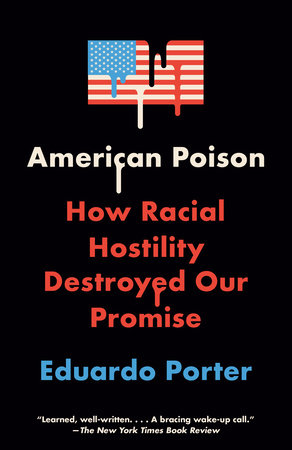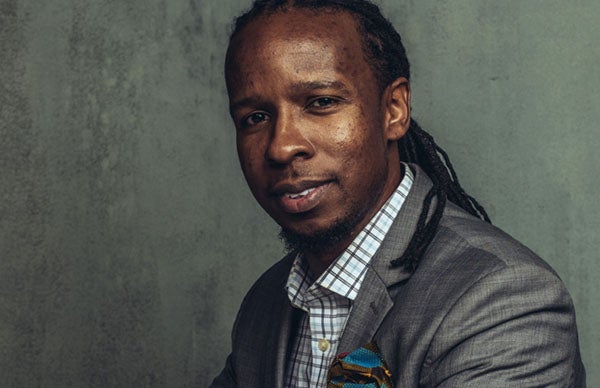Eduardo Porter
Economics reporter at The New York Times and author of American Poison

-
About Eduardo Porter
Eduardo Porter has worked as a reporter for over two decades, covering business and economics across multiple countries. From his beginnings as a financial reporter at Notimex in Mexico City, he has since reported from Tokyo, London, São Paulo, Los Angeles, and many other global hubs. Before joining The New York Times in 2004, Porter was the editor of the Brazilian edition of América Economía and covered the growing Hispanic population in the United States for The Wall Street Journal. At The New York Times, Porter served on the editorial board from 2007 until 2012, before starting the Economic Scene column. He has explored the world’s most urgent economic challenges and the social consequences of financial inequality.
Both Eduardo Porter’s professional and personal experiences taught him that racial disparities are not just detrimental for people of color but for the entire nation’s economic and social health. In his latest book, American Poison, Porter examines how racism has stunted America’s development of crucial institutions necessary for a healthy society, such as housing and education. Compared to other industrialized nations, the United States is lagging in nearly every indicator of social health. In his talks, Porter explores how racial divisions and immigration hostility are hindering America’s growth, and how creating social trust through solidarity is a crucial step in building the cohesive society necessary for maintaining a strong economy.
Porter graduated from the Universidad Nacional Autónoma de México, earned a Master of Science from Imperial College of Science and Technology in London, and was the 2018 University of California, San Diego School of Global Policy and Strategy fellow, focusing on trade, immigration, and their effect on the United States. He currently lives in New York City.
Contact us for more information about booking Eduardo Porter for your next event.
-
Speaking Topics
American Poison: How Racial Hostility Undermines the Social Contract
How did the United States—the most prosperous country on earth, which created the world’s largest middle class—allow itself to become prey to social dysfunction unseen in other wealthy nations? The United States has the highest teen pregnancy rate among rich countries, the steepest infant mortality, the deepest poverty, the most yawning inequality, and the highest imprisonment rate. Eduardo Porter unpacks why the American government appears uninterested in alleviating these social ills, cutting support for the marginalized while so many Americans are falling through the cracks.
Immigrants Will Save the World
You wouldn’t know this from the nature of current debates, but there is no more powerful tool to reduce global poverty and raise living standards than immigration. Contrary to popular belief, immigration does no harm to domestic workers, and has actually been found to create higher paid jobs for locals: the strawberry picker in California creates jobs upstream in strawberry processing. Most critically, it drastically raises both the income of immigrants themselves and the overall GDP: 26 million foreigners in the American labor market added some $2 trillion to the American economy in 2019, according to the National Academies report. As they remit money home, immigrants raise living standards in their countries of origin too. Porter understands the ambivalence about immigrants in affluent societies—large flows of immigrants change societies in drastic, unpredictable ways. But, he argues that we should not ignore the enormous economic opportunity that immigration offers the world.
Diversity and its Discontents: How Demographic Change is Reshaping American Politics and Policy
The United States is Browning. Non-Hispanic whites will be in the minority by the early 2040s—they already are in younger demographics. This swing is reshaping America’s politics—pushing whites into a defensive crouch against the change coming down the pike—and pushing political polarization along racial lines. Minorities will, in the end, determine America’s political future, but this ethnic shift is going to produce a lot of conflict between now and then. Porter explains how demographic changes are likely to play out on the political field, and how today’s lawmakers and politicians are scrambling to ensure control of tomorrow’s institutions.
Rethinking the Melting Pot: Building a New Social Understanding of Race
The United States has no choice. If it is to succeed as a polity, as a functioning society, it must come to an inclusive understanding of what “American” means, breaking across the ethnic boundaries that have stood in the way of solidarity across the nation’s history. There are some signs that it might: interracial marriage has increased substantially, and cities are far more integrated than they've been since 1910. Still, hostility across ethnic and racial borders remains front and center in American politics. Porter argues that our society’s goals cannot be achieving racial justice by forcing whites to compensate nonwhites for decades of oppression. Instead, we must build a country that acknowledges our different strains and invites them all into the tent.
Immigration and the Global Future of Populism
Immigration remains the most popular escape route for people trapped in impoverished countries. As climate change and automation further restrict developing nations’ paths out of poverty, migration to the rich world is likely to exert an even more powerful draw. Rich countries will try to hold the line at their borders. But this will open a political chasm, pitting liberal democrats on the defensive against populist parties driven by xenophobia, and willing to resort to anything to keep foreigners out. Porter explains that wealthy nations are doing themselves no favors by battening down the hatches. Instead, their ideal strategy should be to think about how best to incorporate the new arrivals within their social and economic structures. Rich nations are doing themselves no favors by battening down the hatches. Their ideal strategy should be to think about how best to incorporate the new arrivals within their social and economic structures.
-
Video
-
Praise for Eduardo Porter
Praise for American Poison
American Poisonis a devastating, brutally honest, wonderfully researched read. It is also necessary and incredibly timely. From its discussion of how racism affects everything to its invitation to African Americans and Hispanics to unite and battle it together, Porter has crafted a narrative that ultimately becomes a statement: What we've done so far is wrong, and it's time to change it.
— Gabino Iglesias, NPRPowerful. . . A scathing analysis of misguided white antagonism toward social welfare programs. . . This book should find a place in libraries documenting America’s virulent racial history through the present.
— Lewis M. Steel, Inequality.orgWith a scintillating rhythm and pointed language, the author exposes all the ways in which racism has infected everything from unions to welfare to education and immigration policy. . . The potency of Porter’s argument is bolstered by his impressive source list and straightforward prose. American Poison is a work for our times from a writer who has found his subject.
— Colleen Mondor, BooklistAn anguished and incisive treatise on how racism has contributed to 21st century America’s economic and social decline. . . [Porter’s] cogent presentation succeeds in making the problem of racial animus relevant to all Americans. Progressive readers will concur with this bracing sociological study.
— Publishers Weekly[Porter] clearly delineates a wide variety of conundrums that face American citizens, exacerbating divisions and hurting everyone. . . [He] capably pulls the strands together to demonstrate one of the narrative’s most important ideas: how the U.S. lacks a true safety net. . . Another solid addition to the necessarily growing literature on one of America’s most intractable issues.
— KirkusAn outstanding analysis of the central role that racial hostility has played throughout America’s history in shaping the institutions that rob so many Americans of the promises of its democracy.
— Clara Rodriguez, author of Changing Race“There are many problems that Americans deny, dismiss or blame on others, and racism is at the top of the list. This unflinching book confronts the stark reality of how racism continues to stand in the way of even the most obvious solutions to many of our national problems.”
— Naomi Oreskes, author of Why Trust Science?If you yearn for a really sophisticated discussion of the rise of Trumpism in America, you have to read American Poison. Couching his lucid arguments in both historical and cross-cultural contexts, and drawing upon the most careful social science research, Eduardo Porter illuminates how racial hostilities emerge from, and can be restrained by, changing social, economic, and political situations. This book is an eye-opener!
— William Julius Wilson, author of When Work DisappearsEduardo Porter finds in the nation’s struggles with racism the will to move forward—not to a post-racial society, not yet, but to a multicultural, tolerant future. American Poison is a must read to understand the United States in this already turbulent century.
— Jorge Ramos, author, Stranger: The Challenge of a Latino Immigrant in the Trump EraSeventy-six years ago, Gunnar Myrdal called it “The Negro Problem and Modern Democracy.” Eduardo Porter provides a much needed updating. In an incisive and alarming analysis, he shows how racial dissonance is incited by white Americans. His innovative insights explain so much.
— Andrew Hacker, author of Two Nations: Black and White, Separate, Hostile, UnequalPraise for The Price of Everything
Porter’s work out to ring up the audience for Steven Levitt’s Freakonomics.
— Booklist -
Books by Eduardo Porter
-
Media About Eduardo Porter
Request Fees
and Availability
- 212 572-2013
- Eduardo Porter travels from New York City, New York
Featured Title

American Poison
"With courage and clarity, Eduardo Porter reveals the underpinnings of race in America and the stark challenge of overcoming the divides that have fueled demagogues like Trump. He explains that finding a common national and cultural identity will require tackling the deeply ingrained tribal logic with which America has organized its world. Powerful, sobering, and essential."—Robert B. Reich, author, The Common Good








